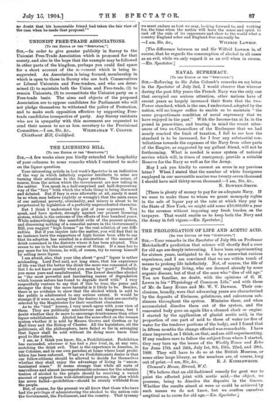THE PROLONGATION OF LIFE AND ACETIC ACID. pro THE EDITOR
OF THE "SPEOTATOR.1 Sin,—Your remarks in the Spectator of July 9th on Professor Metchnikoff's prediction that science will shortly find a cure for old age are deeply interesting. I have been experimenting for sixteen years, instigated to do so by a somewhat curious experience, and I am convinced that we are within touch of means to prolong life indefinitely. Not, of course, the life of the great majority living, who are doomed already by some organic disease, but of that of the man who " dies of old age." You are familiar, no doubt, with the opinions of G. H. Lewes in his "Physiology of Common Life," and with those of Mr. de Lacy Evans and Mr. W. V. Dawson. Their con- clusions, broadly, were that advancing years are characterised by the deposits of fibrinous, gelatinous, and calcaxeons sub- stances throughout the system. Minimise these, and when accumulated dissolve them out of the system, and the renovated body goes on again like a cleaned clock or engine. I started by the application of glacial acetic acid, in the proportion of one part of acid to three of water (or five of water for the tenderer portions of the body), and I found that in fifteen months the change effected was remarkable. I have since improved, as I think, on that, and am still experimenting. If any readers care to follow the subject from where I started, they may turn up the issues of the Weekly Times and Echo for June 17th and 24th, July 1st, 8th, 15th, 22nd, and 29th, 1888. They will have to do so at the British Museum, or some other large library, as the numbers are, of course, long [We believe that an old-fashioned remedy for gout was to paint the affected joint with acetic acid,—the object, we presume, being to dissolve the deposits in the tissues. Whether the results aimed at were or could be achieved by such means we do not know, but we confess ourselves sceptical as to cures for old age.—En. Spectator.]


































 Previous page
Previous page